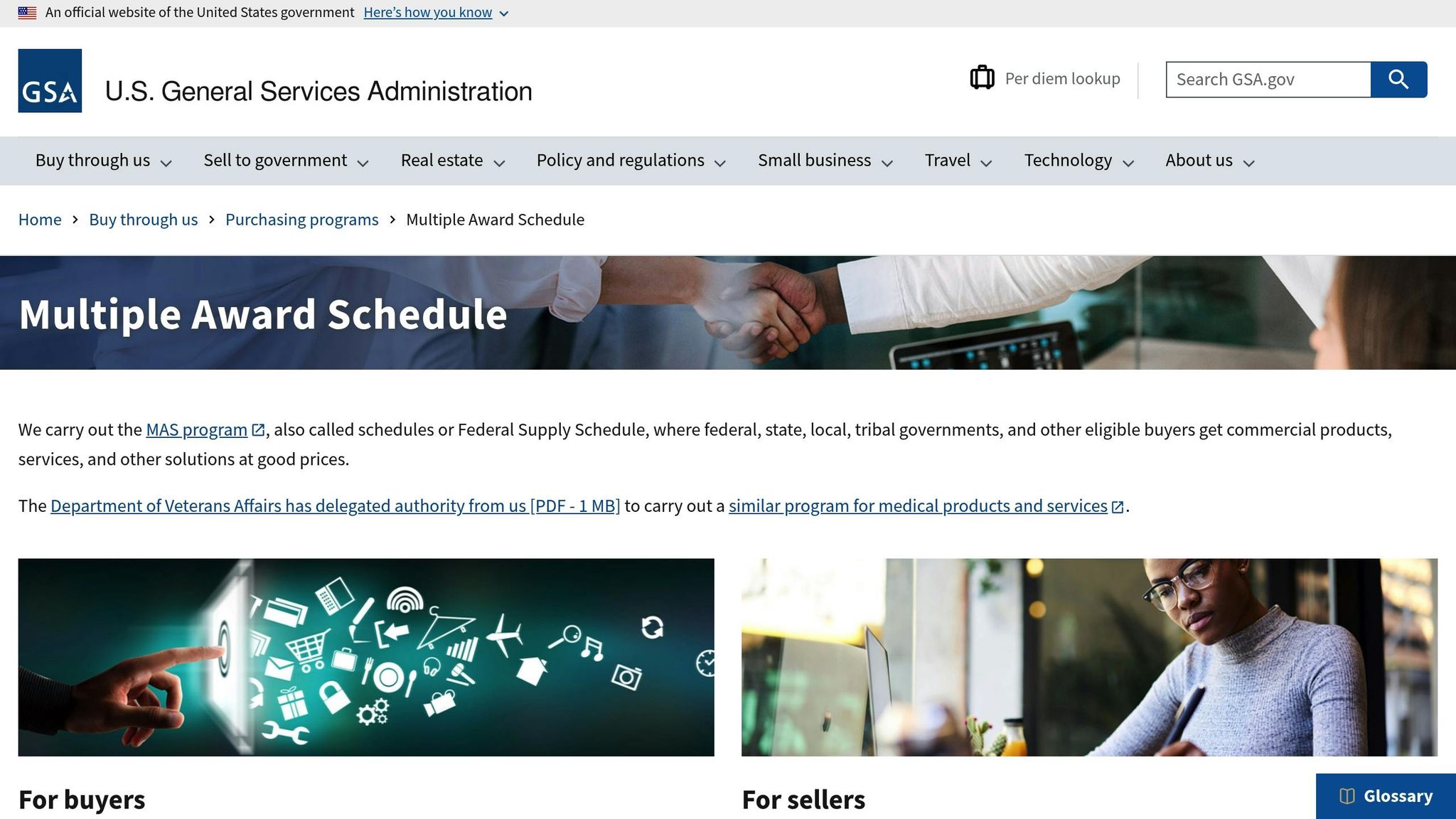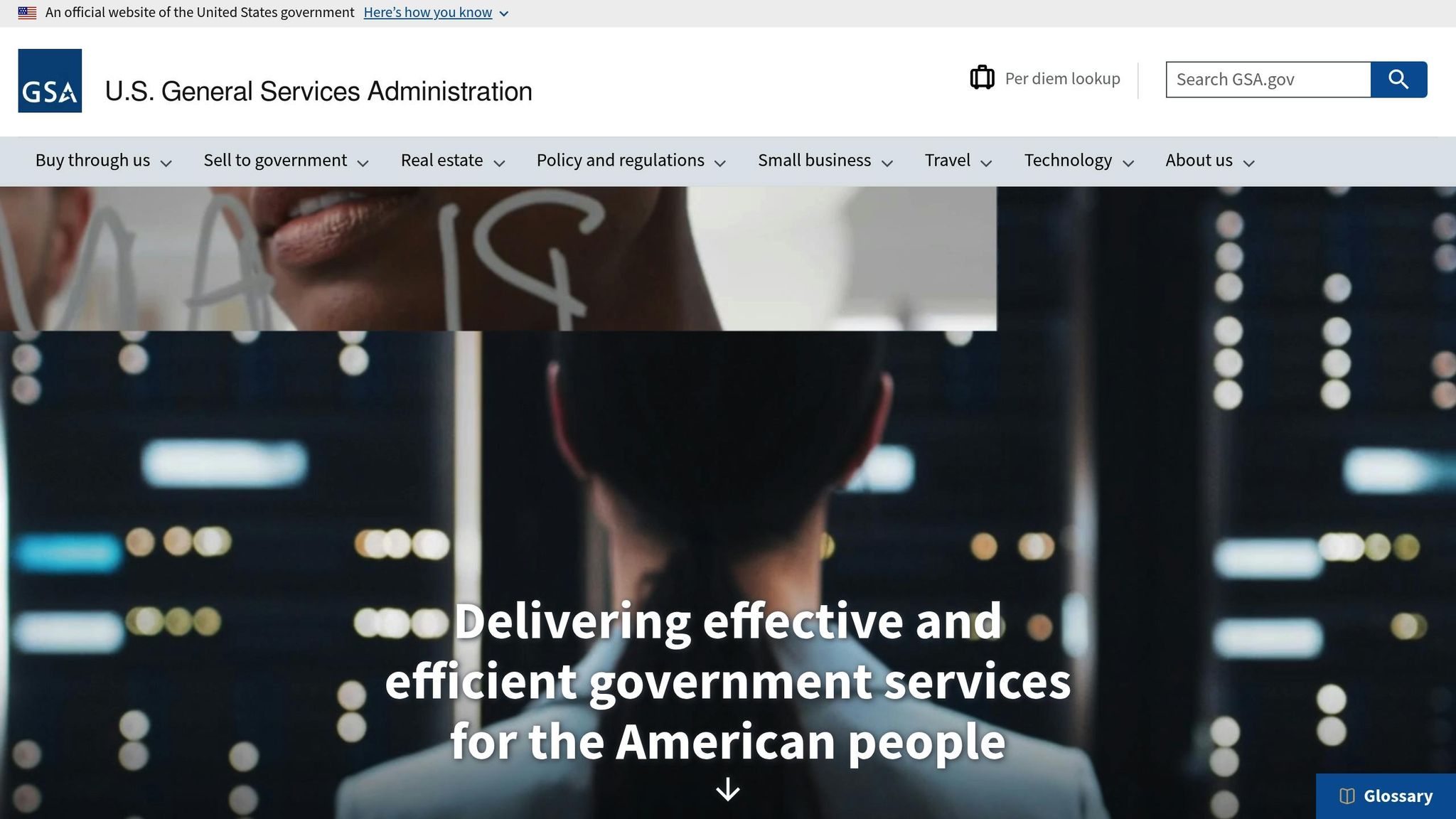Confused about GSA Advantage vs. open market procurement? Here’s the truth:
- Myth 1: GSA Advantage is always more expensive. While upfront prices may seem higher, GSA Advantage often saves money overall with pre-negotiated discounts, shorter procurement times, and reduced administrative costs.
- Myth 2: Open markets offer better competition. GSA Advantage ensures quality and fair pricing with pre-vetted vendors, while open markets are better for unique or specialized needs.
- Myth 3: GSA Advantage lacks transparency. It provides clear pricing, vendor details, and automated compliance checks, simplifying the buying process.
Quick Comparison
| Factor | GSA Advantage | Open Market |
|---|---|---|
| Procurement Timeline | Days | Weeks or months |
| Vendor Qualification | Pre-vetted | Open to all |
| Pricing Structure | Pre-negotiated rates | Variable |
| Administrative Burden | Low | High |
| Best For | Routine, standard needs | Custom, specialized needs |
Understanding these systems can help your business tap into billions of dollars in federal opportunities. Let’s break it down further.
GSA Schedule Basics Part 1

1. GSA Advantage Prices Are Not Always Higher

There’s a common belief that GSA Advantage prices are higher than open market alternatives. But when you look at the total cost of acquisition, the picture often changes. The real savings become clear when you factor in the full procurement process.
Pre-Negotiated Pricing Perks
GSA contracting officers negotiate "Most Favored Customer" pricing, ensuring volume discounts while cutting down on administrative hassles and hidden costs.
Hidden Cost Differences
When you compare GSA Advantage with open market procurement, several cost-saving advantages emerge:
| Cost Category | GSA Advantage | Open Market |
|---|---|---|
| Procurement Lead Time | Shortened by weeks or months | Lengthy due to the full solicitation process |
| Compliance Verification | Vendors are pre-vetted | Requires independent verification |
| Contract Development | Uses established contract vehicles | Requires creating new contracts |
| Risk Management | Lower risk thanks to pre-screened vendors | Higher risk of non-performance |
Savings Through Volume
The GSA Schedule program is designed to deliver savings in multiple ways:
- Automatic Price Reductions: Vendors must pass along price cuts offered to similar commercial customers.
- Tiered Pricing: The more you buy, the less you pay per unit.
- Blanket Purchase Agreements (BPAs): Agencies can negotiate additional discounts beyond standard GSA pricing.
These mechanisms, combined with streamlined processes, often make the overall cost lower than open market options.
Administrative Efficiency
In 2023, the GSA Schedule program facilitated $45 billion in transactions. This scale brings cost advantages by leveraging pre-vetted vendors and established procurement channels. While upfront prices may occasionally seem higher, the combination of negotiated pricing, reduced administrative burdens, and volume-based savings often makes GSA Advantage the smarter, more cost-effective choice.
2. Competition Methods in Both Systems
Myth: Open markets always lead to better competition. The truth is more complex.
Structured vs. Dynamic Competition
GSA Advantage promotes competition through pre-negotiated contracts. These contracts ensure vendors meet federal standards, offering consistent quality and fair pricing across the board. This structured system contrasts with the open market, where competition revolves around specific Requests for Proposals (RFPs) or Requests for Quotes (RFQs). While this dynamic approach allows for flexibility to meet unique needs, it often results in longer procurement times and added administrative tasks.
Competition Comparison
| Aspect | GSA Advantage | Open Market |
|---|---|---|
| Vendor Entry | Pre-vetted | Open to all |
| Pricing Model | Fixed pricing | Flexible per project |
| Competition Type | Continuous | Project-specific |
| Quality Assurance | Standardized | Case-by-case |
| Response Time | Immediate | Varies by solicitation |
This comparison highlights that both systems have their strengths and are suited to different needs rather than one being universally better.
Specialized Needs vs. Standard Purchases
For routine, recurring purchases, GSA Advantage offers a streamlined process with its pre-vetted vendor pool. This reduces administrative effort while maintaining healthy competition. On the other hand, when agencies need custom solutions that fall outside the scope of GSA Schedules, the open market becomes indispensable.
Compliance and Standards
Both systems adhere to federal standards, but their methods of ensuring compliance differ. GSA Advantage simplifies this by pre-verifying vendors, while open market purchases require verification for each transaction. This difference impacts both the speed of procurement and the associated compliance costs.
Current trends suggest that GSA Schedules are increasingly favored for routine government purchases, with open market methods reserved for more specialized needs. These competitive approaches underline the transparency and flexibility of GSA Advantage’s processes.
sbb-itb-8737801
3. Understanding GSA Advantage’s Transparency
There’s a common misconception that GSA Advantage lacks transparency compared to open market procurement. In reality, GSA Advantage offers a structured and clear system that simplifies purchasing for government buyers.
Standardized Information Access
One of the standout features of GSA Advantage is its standardized product listings and detailed vendor information. Each product comes with comprehensive specifications, compliance certifications, and performance data. This level of detail ensures consistency, something that’s often missing in open market purchases.
Pre-vetted Compliance Framework
GSA Advantage takes vendor transparency to another level with its rigorous vetting process. Vendors are subjected to background checks, financial stability reviews, and performance verifications. This thorough process creates a trusted marketplace, where buyers can confidently make purchases without needing to conduct their own compliance checks for every transaction.
Price Visibility and Comparison
Clear, pre-negotiated pricing is another cornerstone of GSA Advantage. Government buyers can easily compare rates across multiple vendors, thanks to the platform’s transparent pricing structure. The Most Favored Customer clause ensures that buyers receive competitive rates.
Below is a quick breakdown of how GSA Advantage’s pricing features benefit buyers:
| Pricing Feature | Benefit to Buyers |
|---|---|
| Pre-negotiated Rates | Removes the need for individual price negotiations |
| Visible Pricing | Simplifies vendor comparisons |
| Bulk Purchase Power | Leverages the government’s collective buying strength |
| Standardized Terms | Provides a consistent pricing framework |
Documentation and Reporting
Accountability is a key strength of GSA Advantage. The platform automatically generates detailed records for every transaction, including vendor certifications, pricing breakdowns, and delivery terms. This seamless documentation process not only ensures transparency but also minimizes the administrative burdens that often come with open market procurement.
Small Business Visibility
GSA Advantage also prioritizes small business participation. Thanks to standardized listing formats, small vendors enjoy the same visibility as larger companies. The platform highlights small business designations – such as woman-owned, veteran-owned, and HUBZone businesses – making it easier for agencies to meet their small business contracting goals.
This combination of clear information, competitive pricing, and vendor accountability underscores why federal agencies increasingly rely on GSA Advantage for their procurement needs.
Side-by-Side Comparison
Taking a closer look at GSA Advantage and open market procurement reveals key differences that impact everything from timelines to vendor qualifications.
GSA Advantage and Open Market: Key Differences
The procurement methods differ significantly in structure and purpose. GSA Advantage offers a streamlined, standardized approach, while open market procurement provides the flexibility needed for unique or specialized requirements.
| Factor | GSA Advantage | Open Market |
|---|---|---|
| Procurement Timeline | Completion in days | Can take weeks or months |
| Vendor Qualification | Pre-vetted through rigorous processes | Basic registration requirements |
| Pricing Structure | Pre-negotiated rates | Variable pricing based on market conditions |
| Administrative Burden | Minimal paperwork with a streamlined process | Higher administrative requirements |
| Product Flexibility | Standardized categories and specifications | Accommodates specialized needs |
| Competition Framework | Controlled environment with pre-qualified vendors | Open participation with less standardized terms |
This table underscores how each procurement method aligns with different purchasing priorities.
GSA Advantage stands out for its efficiency. Pre-negotiated rates, pre-vetted vendors, and reduced paperwork make it a faster and more cost-effective option compared to open market methods. These benefits can significantly lower overall procurement costs.
On the other hand, open market procurement is ideal for specific, tailored needs, such as:
- Custom-engineered solutions
- Emerging technologies not yet included in GSA schedules
- One-time, specialized services
- Pilot programs
For small businesses navigating these options, GSA Focus can provide the expertise to simplify the process and ensure compliance with federal requirements.
Conclusion
Understanding the realities of GSA Advantage and open market procurement is key to making informed decisions in federal contracting. Clearing up misconceptions about these programs can open doors to valuable opportunities.
The GSA Schedule program handles an impressive $45 billion in annual transactions, offering notable benefits such as reduced competition, simplified procurement processes, and steady revenue potential.
"The GSA Program delivers High-Value, Low-Competition Bids, sent by email, for 20 Years." – GSA Schedule Services
For federal contractors, mastering the GSA Schedule process is essential to unlocking its full potential. With only 4% of small businesses currently holding GSA Schedules, the rewards can far outweigh the challenges. Expert guidance can make navigating this complex process much easier. GSA Focus specializes in helping businesses secure GSA contracts while ensuring they meet federal compliance standards.
FAQs
Why does GSA Advantage often provide better overall value than buying on the open market, even if the prices seem higher at first?
GSA Advantage stands out for its pricing, which is based on pre-negotiated rates that already factor in compliance with federal requirements. This setup not only simplifies the buying process but also cuts down on risks for purchasers. While the initial prices might seem higher at first glance, they often reflect added benefits like quality assurance, smoother procurement, and reduced administrative workload – leading to long-term savings.
Another key advantage is the high standards vendors must meet to be part of GSA Advantage. These strict requirements ensure dependable quality and reliability, which can minimize issues and reduce overall costs throughout the lifecycle of the purchase compared to what you might encounter with open market alternatives.
What are the main advantages of choosing pre-vetted vendors on GSA Advantage over selecting vendors on the open market?
Using pre-vetted vendors on GSA Advantage comes with several distinct advantages over sourcing from the open market. For starters, every vendor listed has passed a thorough approval process to meet the General Services Administration‘s (GSA) stringent standards for compliance, quality, and pricing. This means you can skip the uncertainty and avoid the risk of dealing with unreliable suppliers.
Another major perk is the pre-negotiated pricing. These rates are carefully evaluated to ensure they’re fair and reasonable, often leading to noticeable cost savings compared to open market options. This helps government buyers stick to their budgets without the hassle of drawn-out price negotiations.
On top of that, the buying process on GSA Advantage is designed to save time. With pre-approved vendors and standardized terms in place, buyers can quickly locate and purchase what they need – avoiding the delays and complications that often come with open market transactions.
When should a business choose open market procurement instead of GSA Advantage for federal contracts?
Businesses might opt for open market procurement instead of using GSA Advantage in situations where the GSA Schedule doesn’t meet their specific needs. For instance, if a required product or service isn’t available on GSA Advantage or if an agency needs a highly tailored solution, the open market route could be a better fit.
There are also cases where federal agencies need to buy items that fall outside the scope of GSA Schedule Contracts, making open market purchases essential. However, keep in mind that this approach often comes with more intricate processes and stricter compliance requirements compared to the simpler, streamlined purchasing options through GSA Advantage. Taking the time to thoroughly assess your business’s offerings alongside the agency’s unique needs is key to choosing the right path.
Related posts
- GSA Schedules vs. Open Market Bidding
- GSA Ordering vs Open Market Purchasing
- GSA Advantage vs Open Market: Key Differences
- How GSA Advantage Simplifies Federal Buying



